Education

The Comedy Central duo has long been using comedy to challenge injustice. Now they’re tackling education.
The new skit portrays Keegan-Michael Key and Jordan Peele as primetime anchors of “TeachingCenter,” a show meant to mimic ESPN’s flagship athletic program, SportsCenter. The two hosts obsess over new teaching trades, a live draft for teachers, and an in-depth analysis of pedagogical technique. We even get a glimpse at a BMW commercial starring an educator.

On this fast day, I remember that many U.S. people worry — like anyone anywhere — about the hardships a new day may bring, in a dangerous and uncertain time that seems to be dawning on every nation and the species as a whole. In the U.S., we carry the added knowledge that most of the world lives much more poorly — in a material sense, at least — than we do, and that were the sun to truly rise upon the U.S., with familiar words of equality and justice truly realized, we would have to share much of our wealth with a suffering world.
We would learn to "live simply so that others might simply live." We would find deep satisfaction in beholding faces like those of my friends gathered for a friendly morning meal before a day of voluntary fasting. Or, like Mohamedou, we would find warmth in the imagined breath of others sharing involuntary hardships.
"Another world is not only possible," writes author and activist Arundhati Roy, "she is on her way. On a quiet day, I can hear her breathing."
People living in the U.S. must know that life in the daylight might also be the start of an unaccustomed fast.
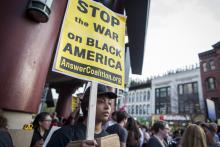
Baltimore, like Ferguson, is a parable — a story that can teach us important lessons. It's one in which we should see that we are, for the most part, still missing the most important lessons.
Decades of bad behavior on the part of Baltimore's police force in relation to the black community were brought to light, as in other circumstances of young black men dying at the hands of police. But the parable of Baltimore needs to go deeper.


Patricia Jannuzzi, the veteran Catholic high school teacher from New Jersey suspended for her anti-gay Facebook posts, will be reinstated immediately, school principal Jean Kline said in a letter.
Jannuzzi, a 33-year theology teacher at Immaculata High School in Sommerville, N.J., was forced to deactivate her Facebook page last month after several alumni started circulating screen shots of her sharply worded posts against gay marriage and gay rights. Two days later, the school placed her on administrative leave.
The letter to students and parents, quoting school director Msgr. Seamus Brennan states in part:
“Immaculata High School has reached an understanding with Mrs. Patricia Jannuzzi. It is the School’s position that a Catholic school teacher must always communicate the faith in a way that is positive and never hurtful. Tone and choice of words matter and I trust Mrs. Jannuzzi’s stated promise to strive always to teach in a spirit of truth and charity.”

Harvard professor Robert Putnam jokingly calls himself “a nice Jewish formerly Methodist boy.”
But the public policy expert’s new book, Our Kids, reads more like a tent meeting revival, complete with an “altar call” at the end. His private meetings and public appearances at the White House and Capitol Hill, and meetings with civic and faith leaders across the country, carry the same fervor.
While evangelists convict people of their sinful ways and then convert them to the path of salvation for the hereafter, Putnam’s focus is more on this side of heaven.
His goal: to awaken and inspire Americans to “save” young people from a future trapped in a spiral of fractured families, poor schooling, and a grim economic future that Putnam says will cost taxpayers trillions of dollars. Trillions.
He is not only aiming for political, social, and religious elites. He’s also aiming at the everyday reader from Boston to Dubuque with a message that failure to act will “undermine democracy and political stability for all.” That’s why the book is subtitled, “The American Dream in Crisis.”
“I’m writing for ordinary people, not the political class. I’m holding up a mirror of American society to the ‘haves’ to say ‘look what we’ve become,’” he said.

Sitting in Prajwala's small conference room adjacent to a chaotic market, I asked Sunitha where the strength came from to charge ahead into danger, violence, and sometimes even rejection by the women Prajwala served. I don't remember her exact words - but the gist was that the strength came not from herself, but from faith in her own experience of God. Not a God owned by some religious denomination, but the real One. That One who never let Sunitha down when it was time to pay the staff, deal with the mob, handle corrupt police, or remain resolute in the face of failure.
I have been blessed and humbled to have met these three women and remain inspired by what they do, particularly their commitment to empowering other women and girls. Sunitha told me to not just show up and feel sorry. Send money if you are inclined, but most importantly, speak about sexual slavery and trafficking to everyone you know. Don't allow anyone to pretend it isn't going on in your own community. Only when all men are vocal about this and intolerant of any abuse of women will things improve.
I pray that I may develop a sliver of the courage Anna, Anna, and Sunitha model.

1. How would you describe Akilah Institute’s goals for its students and alumnae? Rwanda today is a far cry from the genocide-torn country that most think of when they hear about it. Rwandans have a vision of a knowledge-based economy, and Rwanda is fast becoming the region’s leader in information technology and new business development. And yet, only 1 percent of Rwandans attend university, and just 30 percent of these are women. We want to make sure that young women have a part to play in building the country’s future.
Akilah’s unique model of market-relevant education empowers young women to launch professional careers and assume leadership roles when they graduate. During their three years at Akilah, students develop English fluency, leadership, public speaking, and critical-thinking skills.
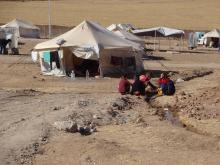
REV. KHALIL JAAR is a warm, passionate, and energetic man—and he needs to be. As the spiritual leader and “go to” guy for the 150 Iraqi Christian refugees living in his church in Amman, Jordan, he needs all the energy he can get.
When I met with Father Jaar at St. Mary, Mother of the Church congregation in Amman, it quickly became obvious how much he loves the refugees who now call this church home. Jaar, himself a refugee, knows something about the trials and tribulations of being forced to leave your home. He is the son of Palestinian refugees of Honduran descent. (His birth name is Carlos and he took the name Khalil when he became a Catholic priest.) He also knows something about the terror of war. Shortly after the 2003 U.S. invasion of Iraq, he was abducted in Baghdad where he was serving, and “only by the grace of God was I freed,” he says.
Jaar is especially dedicated to the education of the Iraqi children forced to leave everything they knew, including their schools. In his overcrowded office, full of stacks of papers and files, Jaar pulls out a large binder. This is his personal reference book, with a page for each child in his care. It includes a photo, a short history of their family and background, their education to date, and also notes about their extracurricular activities and likes, such as soccer and music. It is important to know as much as possible about each child, he says, and make sure that they continue their education.

While some people may have heard of the great work of Nuns on the Bus to engage people on pressing social issues, there’s also the “Nuns on the Underground Railroad”—a quiet movement of nuns working together to restore dignity and healing for victims of labor and sex trafficking across the nation and the world...
For several years now, Catholic nuns have been proactive in preventing sex trafficking before, during, and after major sporting events like the Super Bowl by raising public awareness and conducting personal visits to hotels to alert them to the signs of human trafficking. Nuns have also placed full-page ads in airline magazines to educate the public about the dangers of child trafficking.
A fundamental theological and scriptural principle for Christians is that each human person is made in the image and likeness of God. This belief in the imago Dei helps us to see the face of God even when the person doubts her own beauty and worth because of oppression. “Nuns on the Underground Railroad” seeks to restore a person’s sense of dignity and beauty through two rails of freedom: healing through programs and shelters and empowerment through education and employment.
As we move toward the Lenten season, the prophet Isaiah reminds us: "Is not this the fast that I choose: to loose the bonds of injustice, to undo the thongs of the yoke, to let the oppressed go free, and to break every yoke?" (Isaiah 58:6)
How is God moving your heart as you awaken to the stories of human trafficking victims? What action can you take for your enslaved sister and brother? What will you bring to your faith community to stir up concern? One single action to educate others and liberate the oppressed strengthens freedom throughout the world. As our mission affirms, “Ending slavery is everyone’s work.”

People of faith can play an important role in helping each child of God realize his/her potential. Join us in standing up for education by signing the #UpForSchool petition, an urgent appeal to get every child into school—no matter who they are or where they are born.
When we invest in schooling for all children, lives are transformed for generations to come. For example, closing the education gap for girls reduces child marriage rates, leads to more income later in life, and lowers the rate of HIV/AIDs. Access to equal education is not only essential to building stronger economies and a healthy society, but it honors the God-given dignity of children.
My mom would agree: education is empowerment. It provides freedom and a better future—and no child in the world should be denied it.
Let us all pray that every child can go to school.
And let’s join other faith communities to make sure it happens—sign the petition now.

In the past few months I have come to a rather substantial conclusion: I cannot slow down time. Try as I might, my oldest daughter is now four and a half and is practically sprinting her way to "big kid school." My wife and I have been discussing this next phase of our daughter’s life. Sadly, school districts are falling into massive debt, being subjected to low performance in the classroom and even apathy in educating the next generation. Schools have become too focused on state test scores and benchmarks and have removed the art of learning from many classrooms.
Now private schools are becoming more mainstream, offering alternatives to public education, more flexibility, and more opportunities to the students. For many private schools there is a common element: they are associated with a religious group or Christian denomination. These schools started out as an extension of the ministry of the church as a way to respond to the needs of the community. But over time many popped up as a rejection of the educational system and their "removal" of God or prayer the school. Many parents see disconnect between the mainstream educational system and their Christian households.
But I see a certain danger in some of these Christian alternatives. It might sound counterintuitive for an ordained Christian minister to say, but there are a few reasons I would not send my daughter to some Christian schools.


Redeemer Presbyterian Church, one of the most influential evangelical churches in the country led by author and speaker Tim Keller, has partnered with a Mississippi-based school to form a seminary campus in New York City in 2015.
The partnership between Redeemer and Reformed Theological Seminary fits in with the desire of evangelicals to plant their flag in large cities such as New York. It also reflects the influence of Reformed theology on evangelical thinking, as well as the impact of megachurches on theological education.
And while many seminaries are still suffering declining revenues since the economic crisis of 2008, the model of building campuses in major cities has proved successful for the Mississippi flagship seminary.
Students in the New York City campus will be trained to start churches by pursuing a two-year master’s of arts degree in biblical studies at $430-450 per credit hour before receiving another year of pastoral church planting education from Redeemer. The campus will likely launch in Redeemer’s offices near Herald Square in Manhattan.
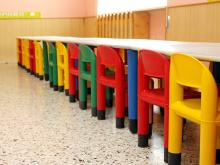
With a new school year upon is us it's appropriate to take a closer look at the troubling and complicated relationship between our nation’s public schools and its criminal justice system.
Growing up in an economically challenged neighborhood in Detroit, it still pains me to remember the sheer number of kids, disproportionately African-American boys, who passed through the juvenile detention system and would later go on to either spend time in prison or who are still in prison now. America’s criminal justice system was omnipresent.
The sad fact is that not much has changed. It’s actually gotten a whole lot worse. America represents less than 5 percent of the world’s population but we have 25 percent of the world’s prisoners. Since the 1970s our prisons have grown by 700 percent. This growth has been most explosive and disproportionate among people of color. Looking at males over the age of 18, 1 out of every 15 African-American men and 1 in 36 Hispanic men in the United States are currently incarcerated. Meanwhile, only 1 in every 106 of white males over 18 are behind bars.
It’s tough to ignore the glaring racial disparities at the center of America’s prison industrial complex. As an African-American woman, Christian, and mother, it breaks my heart and, at times, even tests the limits of my faith. But I also believe in a faith that can move mountains. When it comes to our nation’s criminal justice system, we’ve got mountains to move.
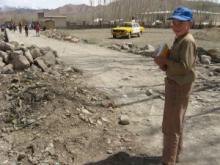
Here in Kabul, one of my finest friends is Zekerullah, who has gone back to school in the eighth grade although he is an 18-year old young man who has already had to learn far too many of life’s harsh lessons.
Years ago and miles from here, when he was a child in the province of Bamiyan, and before he ran away from school, Zekerullah led a double life, earning income for his family each night as a construction crew laborer, and then attempting to attend school in the daytime. In between these tasks, the need to provide his family with fuel would sometimes drive him on six-hour treks up the mountainside, leading a donkey on which to load bags of scrub brush and twigs for the trip back down. His greatest childhood fear was of that donkey taking one disastrous wrong step with its load on the difficult mountainside.
And then, after reaching home weary and sleep deprived and with no chance of doing homework, he would, at times, go to school without having done his homework, knowing that he would certainly be beaten. When he was in seventh grade, his teacher punished him by adding 10 more blows each day he came to school without his homework, so that eventually he was hit 60 times in one day. Dreading the next day when the number would rise to 70, he ran away from that school and never returned.
Now Zekerullah is enrolled in another school, this time in Kabul, where teachers still beat the students. But Zekerullah can now claim to have learned much more, in some cases, than his teachers.
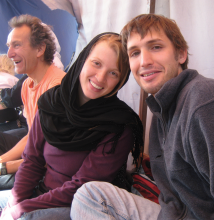
Bio: Kelly and Peter Shenk Koontz spent the last three years serving in Kabul, Afghanistan, through a Mennonite Central Committee partner.
Website: MCC.org
1. What work were you doing in Afghanistan?
We worked with a Mennonite Central Committee (MCC) partner in Kabul as Peacebuilding Project Managers. Our job was to integrate peacebuilding within different sectors of the partner organization, including adult education, community development, and many others. Day-to-day, this primarily meant developing curriculum and planning and conducting trainings for a variety of contexts—including rural community development teams and university students in Kabul.

IN 1961, President Eisenhower warned us about the threat to democracy posed by what he dubbed the military-industrial complex. Today we need an Eisenhower to sound the alarm about another threat to our capacity for self-rule: the educational-industrial complex.
The military-industrial complex gained power because it promised to protect Americans from the spectral threat of Soviet domination. The educational-industrial complex has arisen in response to the fear of economic domination by better-educated populations. But the policies it promotes could leave our population increasingly unable to think for itself or counter the saturating influence of propaganda—whether commercial or political.
What I mean by the educational-industrial complex is that vast network of companies and institutions with a vested interest in education policy: the testing companies, textbook publishers, software developers, technology peddlers, “for-profit” schools, and the armies of high-powered “consultants” that circle U.S. schools like vultures picking the last dollars from the emaciated bones of their budgets. All of these players push an agenda of standardized testing and skills-based curricula that is crowding out both content knowledge (outside of science and math) and the slow, labor-intensive process of reading and discussion that produces the capacity for critical thinking. In the end, we’ll have a deeply ignorant and complacent people who will do as they’re told and buy what they’re sold.
I see this narrowing of educational horizons even in my little corner of the higher education world. At our small state university, faculty members are regularly subjected to lengthy presentations from hired consultants deployed to update our pedagogy—or at least our ed-speak jargon. For instance, last year all teaching faculty had to submit measurable “Student Learning Outcomes,” unfortunately abbreviated “SLO,” for every course we teach. When most of our “outcomes” were deemed “unmeasurable,” a SLO consultant was loosed upon us. From his presentation I learned that an “outcome” was really the same thing that, a decade ago, another consultant called learning “objectives.” In fact, in the middle, our SLO guy started using the two terms interchangeably, leading me to suspect that he had simply changed the jargon in an old presentation and missed a few spots when he did.
THE 67 PEOPLE gathered in the basement of Union Baptist Church in Memphis have come from all over: Appalachian State University and Asbury College, Louisiana State and Liberty University, Wright State and Wheaton College. The youngest is 21; the oldest, 48. They’ve come to teach in some of the lowest performing schools in the state of Tennessee.
For the next 12 months, they’ll live, learn, and pray together, becoming a family as they also learn to become teachers and colleagues. All were drawn by faith and a dream that God is doing unexpected things in the city schools of Memphis.
Welcome to the Memphis Teacher Residency (MTR), a faith-based nonprofit that’s become one of the most effective teacher training programs in Tennessee.
At the front of the room, Rev. Tom Fuerst, an associate pastor at Christ United Methodist Church, gives the morning devotional. His message: The world is broken and so are Memphis schools. But God wants to fix them both. Fuerst describes the idea of “prior grace”—that God is at work in the world long before we are aware of it—and invites the new trainees to become agents of that grace by becoming great teachers.
But Fuerst, like everyone at MTR, is quick to warn the aspiring teachers—known as residents—against proselytizing. The residents, as public school teachers, don’t preach faith in the classroom, hold Bible studies, or actively discuss their faith. That would make the classroom unsafe for non-Christian students, warned Fuerst.
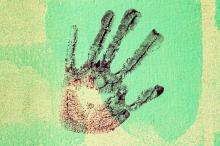
Some of you may know the experience of having a secret about yourself that when revealed makes you have to completely reframe your identity. This happened for me in my junior year of high school when I was offered the opportunity to travel through a college bound program. That is when I learned I was “undocumented.” The reality of the broad impact of this label set in with each evasive answer my mother gave when I asked if I’d be able to not only travel, but drive, or work to help pay the bills. Being undocumented threatened my dreams of going to college; it threatened the possibility of a better future.
I was born in Mexico, and as proud as I am about my ethnicity, there is only one place I know as home, the United States. My father abandoned us when I was 3 years old and this set everything in motion that would lead me and my family to the U.S. When we struggled without his support, my older brother left for the U.S. in search of a better life at the age of 14. My mother’s love for her oldest son drove her to leave her home as well. When my brother learned she was considering leaving me, his young sister, in the care of my uncle while she visited him, he insisted she brought me along. I have now been in the U.S. for 25 years.